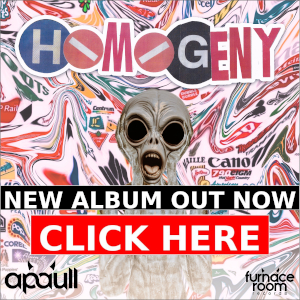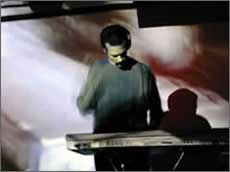
(03.23.05) CHRIS RANDALL is a man who defies categorization. One of those rare
chameleons of the music industry who constantly evolves, he has
actively transformed himself from a stoic workhorse (roadie for KMFDM)
to thick-maned lion, lording over his own pride. As Lord and Master
of Positron! Records, Randall is a musician who has broken the yoke of
the stagnant music industry and made his own way. He has released
more than seven records as Sister Machine Gun — records that pour
sinuous funk and high octane jet fuel into the industrial guitar mold
and melt the whole foundry down — as well as five records as
Micronaut, a high energy big beat persona that has taken his message
of Kung-Fu Mastery over Insipid Riddim Mechanics to the stars and,
shot through with gamma radiation and solar particles, has returned as
a multi-dimensional cinematic explosion.
There really is no way to anticipate the direction the man is going to
move. Contributing Editor Mark Teppo tries anyway, hitting Randall up
for a Q & A about his latest Micronaut opus, Europa, in an
attempt to ascertain how he manages to slide through time and space.
Photo (above) by: Christopher Smith
::..:::…..:..::….:::::..:::..:::::::……:::…::.:::….::::..:..:::…::…….:::::
Igloo :: Europa is a more cinematic record than previous
Micronaut releases. What prompted the shift in focus? What were you
hoping to accomplish?
Randall :: I’m trying to sell out! Seriously, one of my major problems
(or draws, depending on your point of view) is my tendency to be
somewhat scatterbrained about my direction, musically. This is rampant
on the Sister Machine Gun releases; people have told me that they’re
surprised that Burn and Influence are the same band.
Micronaut is a casualty of this habit of mine as well.
Now, that said, the direction of this particular album was determined
by a discovery I made of a couple film composers about two thirds of
the way through the process of recording. I purchased a couple
soundtracks from iTunes on a whim, during a hunt for something new to
listen to, and for some reason only the musical gods will know, these
two albums just ingrained themselves into my consciousness. I actually
ended up throwing out all but one of the songs I’d recorded up to that
point and basically started the album over.
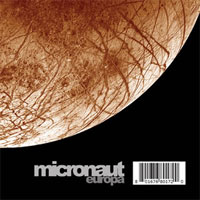
So, Europa certainly has elements that are common to all
Micronaut albums; it also has elements of the Sister Machine Gun sound
(that’s unavoidable, since Miguel [Turnazas] and I write for both
bands), but there’s definitely a new, much darker, part of the picture
that I discovered during the (re)recording of this album.
Igloo :: How did Micronaut come about? Is it an equal persona to
Sister Machine Gun — a full facet of your musical personality?
Randall :: My original thought when creating instrumental music at all
was to make a demo reel for shopping to television production
companies. That’s how I started making this type of music around ’96
or so, where previously I was only concerned with Sister Machine Gun.
We had a show booked for Sister Machine Gun at a university in,
ummm…Peoria, I believe. But due to the fact that SMG was embroiled
in one of many bouts of legal fisticuffs with our label at the time,
TVT, it was beyond complicated to play the show as SMG. So I called
the fellow up to cancel the show, and he asked if I had anything else.
I said, “Well, I’ve got this instrumental stuff; I can probably pull
something off…” So, a naming contest took place on the SMG site, and
an anonymous visitor suggested Micronaut, which everyone seemed to
like. We called the project that, and I wrote enough material for a
show. The rest, as they say…
Igloo :: You’ve built the Positron! Records empire — a fully
independent label that clearly believes in treating the artists right.
The latest releases on Positron! were released under a Creative
Commons Sampling license. Clearly you believe that the arguments of
the RIAA are bunk. I wouldn’t say, without the framework of the record
industry to contend with, that commerce is easier but does an
aggressively honest and open relationship with the audience allow art
and commerce to co-exist more readily in the independent market?
Randall: Well, I’m not going to die wealthy, if that’s what you’re
asking. Look, people are going to share records with each other
whether I piss and moan about it or not, so I might as well not, and
save my Rolaids for more appropriate applications. We are of the firm
opinion that what goes around comes around. While it would be nice to
cruise to the office in a $60,000 car and send my secretary out for
wraps and smoothies whenever I feel the urge, it isn’t something that
helps me make music, or helps the other artists on Positron! make
music. And that’s the end goal: to get our art in to the hands of
people that will appreciate it and enjoy it. We’ll do whatever is
necessary to make that occur, and if we shuffle off this mortal coil
without a lot of money, well, we made our mark in other ways. 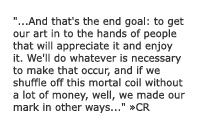
Igloo :: Does the presence of a vital independent market allow for more
creative possibilities? More marketing options? Would Micronaut have
happened if you were still on a major label contract?
Randall: That’s three very different questions. So, I’ll give you
three very different answers.
First, creative possibilities are never directly affected by the
market. Nobody holds a gun to your head and says, “Make a song that
will be on the Billboard Top 40 next week, or I’m going to blow your
fucking brains all over this synthesizer!” Artists make a decision to
either follow their heart, or follow their dreams of money, drugs, and
sex. Sometimes, the dreams and what’s in your heart are the same
thing, but 99.99999% of the time, the two are at odds. It’s a matter
of how much you’re willing to avoid your true nature in order to be
successful.
Now, marketing options. There is a very well-established methodology
for promoting an album or artist. This doesn’t change in the
independent market, which consistently apes the major’s plans, with
less resources. A quarter-page black-and-white ad in a magazine
instead of a two-page color spread, and a little Quicktime file on
your website instead of a video on MTV, but the promotion methods are
the same, differing only in scale. At Positron!, we call bullshit, and
spend most of our time exploring alternative methods. We do buy ads,
and put our bands on tour, but that’s a minor part of our efforts.
Maybe we made the wrong decision long ago, but we’ve got lucky a few
times, and the more you get lucky, the less likely that it is actually
luck.
And would Micronaut have happened if I was on a major? Who knows? I
doubt it. It’s too time-consuming just riding herd on the contract.
Doesn’t leave any time for extra-curricular activities.
Igloo :: What’s the fascination with the moons of Jupiter for album
titles? Is it progression that has a natural end (i.e. when you run
out of moons, you’ve run out of Micronaut records)?
Randall :: There’s always Saturn…
Igloo :: How does the song creation process work? You’ve mentioned in
the past that you write lyrics after you write the music, so at what
point does a song become a lyric-less piece? Or, is the process for
each band completely different?
Randall :: Very rarely will I write a song for SMG, and have it turn in
to a Micronaut track, or the other way around. The creative processes
are quite different. While it’s true that I write the lyrics after the
music is done, when I’m writing for SMG, I always plan for lyrics.
That is to say, I leave room for them, and the song structure that
results sort of demands them. When writing for Micronaut, I’m not
thinking about lyrics at all, the guitar and synth parts are the song structure itself and don’t leave any room for them.

Igloo :: You’re involved with
What do you do with them? Is a living laboratory situation where you
get to build the things you’d like to use?
Randall :: I assume you mean
I’m part owner of that releases music software. Analog Industries is
just a blog site where I ponder subjects of a more technical nature
that aren’t appropriate for the SMG newsgroup and blog. I’m an
advanced blogger, and need more than one blog to get everything out.
Anyways, to answer your question, my role in Audio Damage is mainly
user-interface design and concepts. In that regard, yes, it is a
living laboratory. I definitely think about the stuff we make in terms
of its real-world use, and I (along with the other programmer-types in
the Positron! Galaxy Of Artists) use everything heavily before it is
released for sale, so that we know it actually does what we say.
I can’t code for shit, or at least, not well enough to make a
commercial product, and my knowledge of DSP coding (actually writing
software that makes, say, filters or distortion or whatever) is
limited to knowing it exists. I look at the code that my partner
writes and I’m, like, “How the fuck did he get that from this?” After
the initial design is thought out, and I’ve created a working user
interface, my role is mainly as cheerleader. He does the hard part.
Igloo :: With the expansion of the Positron! roster and the recent
collaboration you did with Manufactura, it is clear that Europa
has been touched by what you’ve heard in those other bands. What
other music is currently influencing you and riding heavy in your
rotation?
Randall :: Boy. Well, let’s see. Scanning my iTunes playlist, I’m
looking at M.I.A., Hrvatski, Roni Size, Scott Sturgis’ record In A
Haze, etc. etc. I tend to like more esoteric electronic music, and
I hear little sounds or melodies or whatever, and work that in to my
creations, of course. All musicians do that.
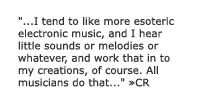
As far as collaborations go, Europa really benefited from Wade
Alin’s (Christ Analogue, Atomica) input. I don’t normally work with
people other than Miguel any more; I gave up trying to get along with
other musical minds a long time ago, but Wade’s programming style
really floors me, and I think that his additions to Europa
really give it an edge it would have lacked. Mike Fisher’s (Amish Rake
Fight) cello part in “Darkness” is to die for. Made it a totally
different song, and a perfect transition point for the album, right
smack in the middle where it switches from nice ‘n’ easy to rough.
Igloo :: You’ve mentioned on your blog that you are working on a “solo”
record. How is that different from Micronaut or SMG?
Randall :: It’ll be very different from Micronaut, but not so different
than some of SMG. To use the term “solo” is sort of misguided. I know
I’ve talked about it as such, but it won’t any more different from SMG
than any SMG album is from any other SMG album, I don’t think. A
little more heavy on the downtempo stuff, a little more heavy on the
more melodic types of songs I write, a lot less of the rough stuff.
But I mean, fuck, it’s time to move on. I’ve made seven Sister Machine
Gun albums and two EPs, along with about 20 singles. I think I’ve
pretty much got my point across with that band, and it’s time to
explore some other frameworks.
Ultimately, the song is going to sound like I wrote it, whether it is
Micronaut, SMG, or whatever. So people that like SMG will probably
like Micronaut, but they’ll definitely like the “Chris Randall” stuff.
People that like Micronaut will probably like SMG, etc.
Igloo :: Disco: dead or undead? If you had to put it down/exhume the
corpse, what would you find useful from the style?
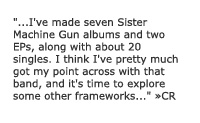
Randall :: Disco? Well, we have it to thank for the four-on-the-floor
dance beat which is now used in absolutely all forms of modern music,
I guess. There isn’t a lot of that style that I find redeeming, truth
be told. Dear gods, please tell me it isn’t undergoing another
revival.
Igloo :: A video game company comes calling. They want to re-issue a
classic game with new music and are looking to have you provide a
soundtrack. What title needs the Chris Randall soundtrack and what
would you write for it?
Randall :: If I was going to write a soundtrack custom for a vintage
game, it would be for a platformer like Super Mario Bros. or
something. I really appreciate the concept of the leitmotif as it
applies to platform games. For something like Resident Evil or
Metal Gear Solid, the music is kind of a continuous minor
seventh drone in the background, but for a platform game, especially
the old ones, there’s a leitmotif for the levels, one for each
character, whatever, and then each element of the game has its own
sound that fits in with the leitmotif no matter what the
circumstances. It takes a special kind of insanity to create music
that all meshes like that, in to a sort of aleatoric hypnotism. So, if
anyone reading this is making a platform game that requires zany
leitmotifs out the ass, I’m you’re guy.
That actually gives me an idea for an album: a new soundtrack for
Super Mario Bros. Hmmmm…
::..:::…..:..::….:::::..:::..:::::::……:::…::.:::….::::..:..:::…::…….:::::
Micronaut is going out on the road in April for the noise.to.signal.05
tour. Rocking the dance floor with Micronaut will be fellow Positron!
Records artist Amish Rake Fight and WTII artist, Monstrum Sepsis.
Europa is out now on Positron Records. 






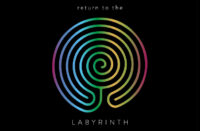




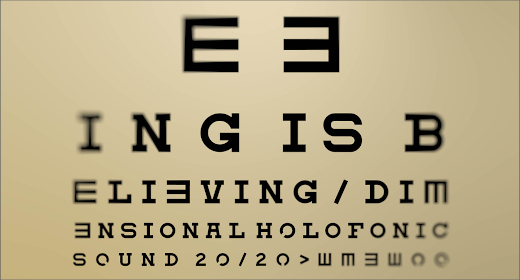
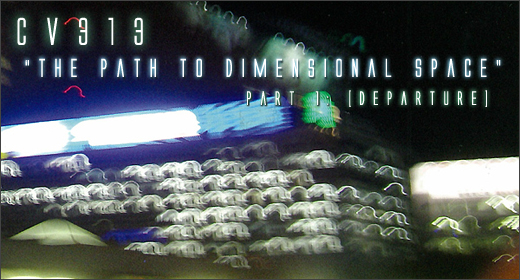


![Pole :: Tempus Remixes (Mute) — [concise]](https://igloomag.com/wp/wp-content/uploads/2025/04/pole-tempus-remixes_feat-75x75.jpg)






![Hasbeen :: Bunker Symphonies II (Clean Error) — [concise]](https://igloomag.com/wp/wp-content/uploads/2025/04/hasbeen-bunker-symphonies-ii_feat-75x75.jpg)
